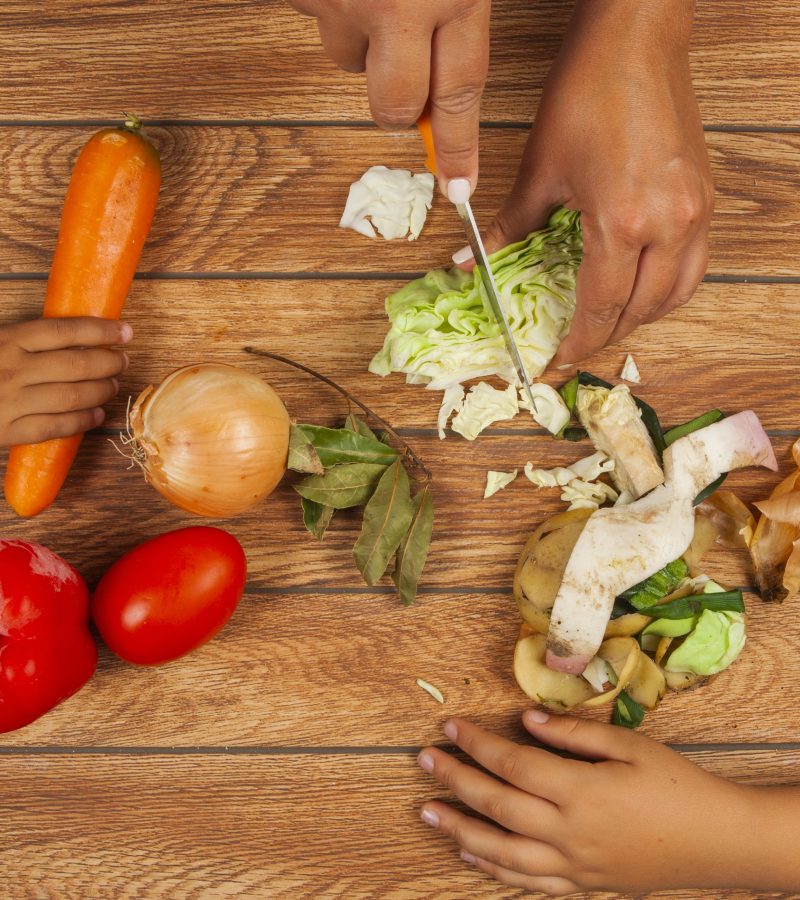This website uses cookies so that we can provide you with the best user experience possible. Cookie information is stored in your browser and performs functions such as recognising you when you return to our website and helping our team to understand which sections of the website you find most interesting and useful.
The Project
What is it about?
Bio-Waste Recovery — Home and Community Composting
In RESIALENTEJO’s area of intervention, approximately 47 thousand tons of waste are collected every year. Of this global amount, about 41% — equivalent to almost 17 thousand tons — is bio-waste. This means that, on average, each person produces 210kg of bio-waste per year. However, this waste is recoverable. It can be segregated and used through home or community composting, as a complementary measure to selective collection, which will be mandatory in Portugal from 2023.
Thus, RESIALENTEJO, in partnership with the municipalities of Barrancos, Beja, Castro Verde, Mértola, Moura, Ourique, and Serpa, is implementing a project aimed at encouraging the expansion of the current home composting network and the practice of community composting, as a way of recovering bio-waste.

How does it work?
Como
funciona
Home Composting
Interested persons must have an outdoor space in their home with a portion of land, preferably in the shade.
Upon joining the project, you will be given a 360-litre home composter, measuring 72.5cm X 72.5cm X 100cm. You must then segregate your organic waste, place it in the composter, monitor the composting process, and use the compost thus produced in your flowerpots, seedbeds, vegetable gardens, or flower gardens.
If you live in any of the following municipalities, you can join the home composting project:
- Barrancos
- Beja
- Castro Verde
- Moura
- Ourique
Joining home composting implies that:
- you take part in a composting workshop promoted by RESIALENTEJO in your area of residence;
you sign a formal document, upon acceptance of the home composter;
you return the home composter in good conditions, should you withdraw from the project;
- you agree to take part in monitoring initiatives, namely by sending regular pictures of the composting process or by accepting to be contacted by the project’s technical team.
Community Composting
The community composter is located in an area of public access, and is managed by a technical team.
Those joining the project will receive a small 10-litre container (size: 29cm high by 20cm wide), and a key to access the community composter implemented in their area of residence. Then they just have to segregate their bio-waste at home, using the container provided by the project, and place it in the community composter. The compost thus produced is delivered free of charge to anyone who requests it, and shall also be used to fertilize public gardens.
You can join the Community Composting project:
- Barrancos
- Castro Verde
- Mértola
- Moura
- Ourique
- Serpa
The municipalities of Almodôvar and Ourique are
currently not covered by the community composting project.
Joining community composting implies that:
- you take part in a composting workshop promoted by RESIALENTEJO in your area of residence;
you sign a formal document upon acceptance of the container and of the key to the community composter;
you return the container and the community composter key, should you withdraw from the project;
you agree to take part in monitoring initiatives, namely by sending regular pictures of your segregation of bio-waste and depositing it in the community composter, or by accepting to be contacted by the project’s technical team.
Advantages of the Project
By participating in the recovery of bio-waste, either by joining home or community composting, you are, with a simple and cost-free gesture, contributing to:
Reducing the amount of waste
By using bio-waste for composting, you are contributing to its recovery and reducing the amount of waste sent to landfill.
Decreasing the environmental footprint
By reducing the amount of waste that needs to be landfilled, you are helping to reduce greenhouse gas emissions and the consumption of fossil fuels.
Producing a natural fertilizer
The compost produced from the composting process is a natural fertilizer, beneficial for your vegetable garden or flower garden, and is an excellent alternative to chemical fertilizers. In addition to helping restore soil fertility, it improves water retention and nutrient delivery to plants.
Contributing to a circular economy
By composting bio-waste, you are returning to the soil, as compost, the organic matter that gave rise to the food consumed.

